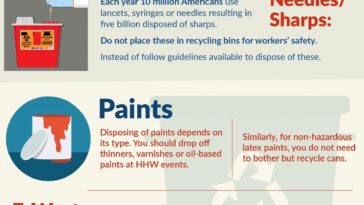Are You Anxious To Discover How To Efficiently Take Care Of Contaminated Materials In Your Rental Dumpster? Explore Expert Advice Aimed At Ensuring Your Security And Preserving The Atmosphere
Are You Anxious To Discover How To Efficiently Take Care Of Contaminated Materials In Your Rental Dumpster? Explore Expert Advice Aimed At Ensuring Your Security And Preserving The Atmosphere
Blog Article
Content Develop By-Lim Skov
When it concerns managing hazardous waste in your rental dumpster, navigating the complexities can be discouraging. From determining potentially unsafe products to ensuring secure disposal practices, skilled suggestions can be the trick to securing both your wellness and the environment. By familiarizing on your own with essential techniques for taking care of contaminated materials, you are taking a proactive action towards responsible waste management. Stay tuned to find necessary pointers that can encourage you to make informed choices and alleviate dangers efficiently.
Identifying Contaminated Materials
To spot hazardous waste in your rental dumpster, examine products for tags indicating threat or toxicity. Look for words like 'combustible,' 'harsh,' 'harmful,' or 'hazardous.' Things such as batteries, chemicals, cleansing items, paints, fluorescent light bulbs, and digital devices may have damaging substances. Check for icons like skulls, flames, or the letters 'RCRA' (Source Preservation and Recuperation Act) on containers.
Be cautious of unlabeled items or unidentified materials, as they could posture risks. Bear in mind, even apparently harmless things like old batteries or ran out medications can be unsafe otherwise taken care of correctly. If you're uncertain regarding a thing, don't surrender the dumpster. It's far better to be safe than sorry when it comes to managing potentially harmful waste.
Safe Handling Procedures
When dealing with hazardous waste in your rental dumpster, always prioritize safety and security by complying with proper handling treatments.
Begin by wearing visit this hyperlink (PPE) such as handwear covers, safety glasses, and a mask to shield on your own from damaging compounds. Make certain to meticulously read and follow the producer's instructions on handling and disposing of the dangerous products.
When taking care of sharp things or damaged glass, use durable gloves and double-bag the items to avoid leaks and leakages. Furthermore, set apart different types of contaminated materials to prevent chemical reactions or contamination.
Constantly keep a spill kit close by in case of crashes, and be prepared to consist of and clean up any spills instantly. Remember to safely seal all containers prior to putting them in the dumpster to prevent leakages and direct exposure to others.
Correct Disposal Techniques
Make certain that you know the correct disposal methods for contaminated materials when utilizing your rental dumpster, maintaining a concentrate on security and ecological responsibility.
When handling contaminated materials, it's vital to adhere to specific standards to prevent injury to yourself, others, and the environment. Beginning by segregating various types of dangerous products to stay clear of chain reactions that can result in hazardous scenarios. Make certain to utilize proper containers that are leak-proof and labeled correctly to guarantee appropriate handling during disposal.
Additionally, research study regional regulations and disposal centers that can approve hazardous waste to guarantee that it's taken care of appropriately. Never try to take care of hazardous waste in a routine trash bin or put it down the tubes, as this can have serious repercussions.
Final thought
To conclude, when taking care of contaminated materials in your rental dumpster, bear in mind to focus on safety by following specialist suggestions on recognizing, dealing with, and getting rid of these products.
By using protective gear, setting apart waste, and researching local laws, you can prevent damage to on your own, others, and the atmosphere.
Stay link webpage , be cautious, and constantly prioritize safety first.
